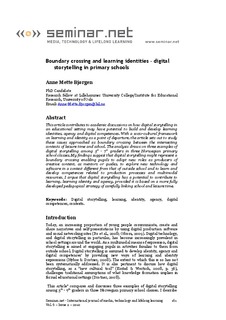Boundary crossing and learning identities – digital storytelling in primary schools
Journal article, Peer reviewed
Permanent lenke
http://hdl.handle.net/11250/144656Utgivelsesdato
2010Metadata
Vis full innførselSamlinger
Originalversjon
Bjørgen, A. M. (2010). Boundary crossing and learning identities–digital storytelling in primary schools. Seminar.net, 6(2), 161-177.Sammendrag
This article contributes to academic discussions on how digital storytelling in
an educational setting may have potential to build and develop learning
identities, agency and digital competences. With a socio-cultural framework
on learning and identity as a point of departure, the article sets out to study
these issues approached as boundary crossing between the intersecting
contexts of leisure time and school. The analysis draws on three examples of
digital storytelling among 5th - 7th graders in three Norwegian primary
school classes. My findings suggest that digital storytelling might represent a
boundary crossing enabling pupils to adopt new roles as producers of
creative content, as mentors or guides, to explore new technology and
software in a context different from that of outside school and to learn and
develop competences related to production processes and multimodal
resources. I argue that digital storytelling has a potential to contribute to
learning, learning identity and agency, provided it is based on a more fully
developed pedagogical strategy of carefully linking school and leisure time.
